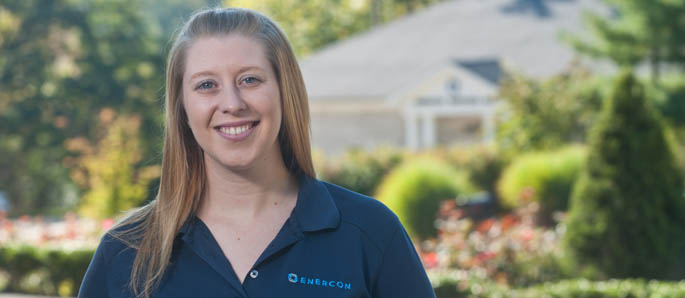Master's Degree in Environmental Studies Puts Alumna a Step Ahead Tuesday, October 16, 2012

Meet Michelle (Wunderley) Finlay
Job Title: Staff Environmental Specialist
Employer: Enercon Services, Inc.
Degrees earned: Master of Science in Environmental Studies, Point Park University; Bachelor of Science with environmental studies focus and a minor in biology, Penn State University
Graduation years: 2012 and 2010
Hometown: Saegertown, Pa.
Now living in: Irwin, Pa.
Hobbies/interests: Fishing, traveling and anything outdoors!
Update: Michelle is now a compliance engineer for Bettis Atomic Power Laboratory.
Why did you choose Point Park's Master of Science in environmental studies program?
The M.S. program really stood out to me for two main reasons. First, it was an accelerated program, which was really appealing. I had just finished my B.S. degree and honestly, more schooling was the last thing I wanted to do. Second, Point Park offered classes in environmental law and environmental policy. These two classes really helped me get to know, use and understand the different regulations that deal with environmental issues.
When I was looking for jobs, it seemed every position wanted someone with knowledge of specific regulations. I knew that was something I needed and was looking for from a M.S. degree program. Finally, another reason I chose Point Park was that it is in Pittsburgh, a place in which I wanted to move to and was searching for jobs.
As an environmental specialist, how has your master's degree helped you?
The M.S degree has helped me learn about the regulations and key problems that are hot topics in the environmental field. Having this knowledge really gave me a step ahead of many by just having a general knowledge of the regulations. This knowledge was something that I lacked from my B.S. degree program. Science-geared jobs are very competitive, so having additional education is valuable.
How would you describe Point Park's professors?
Most of the professors that I had for classes were extremely knowledgeable and I learned quite a bit from them. They had stories and personal experiences that were relevant in the topics we covered. All of the professors were very friendly, easy to talk to, and responded to any questions or concerns I had. The professors asked challenging questions that really made you think about how to handle a situation or how to respond. It sure was not an easy program because they wanted you to be able to learn and think about things from different perspectives.
What advice do you have for individuals considering a career in environmental studies?
Find an environmental niche that you want to go into, whether it is more office-based or field-based. Then from there decide what area of environmental studies you are interested in such as water, air or soils. There are many paths to choose from and knowing what you like and don't like will help you narrow down where to focus and what types of jobs are out there for you.
Is there anything else you'd like to add?
When working in the environmental field, remember there are many people who may not have the same views on a topic that you have. Finding a job that fits your own views can be difficult, but stick with it and the right company or job for you will come along.

